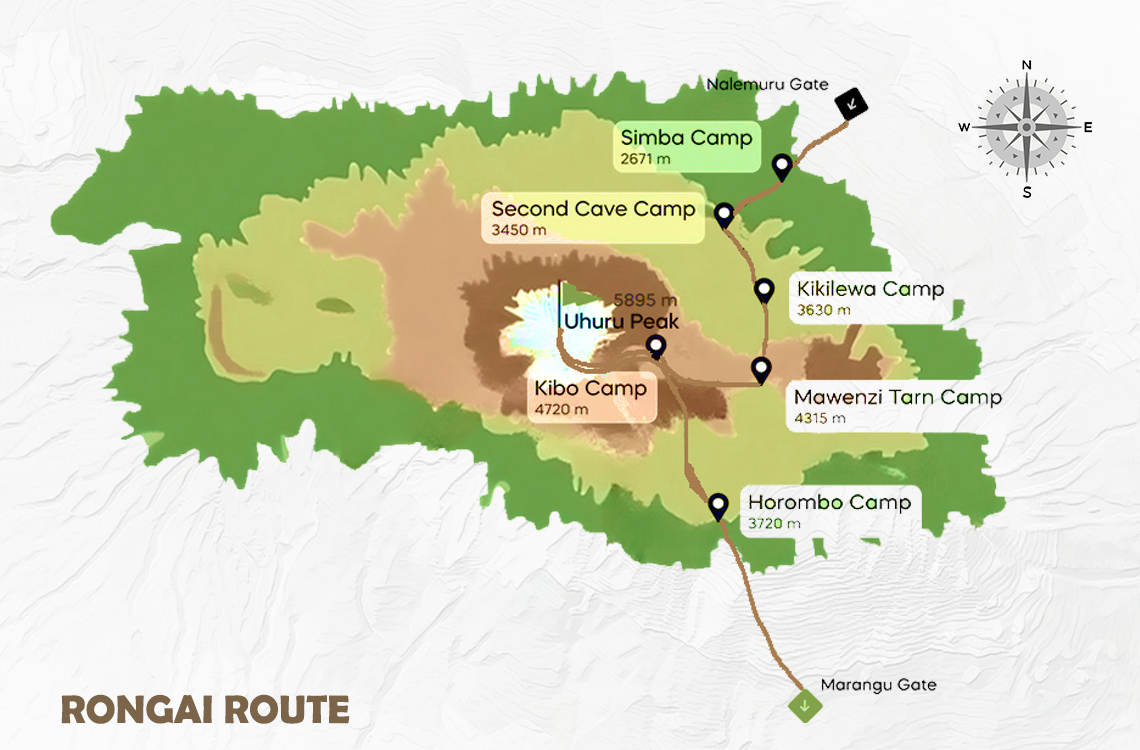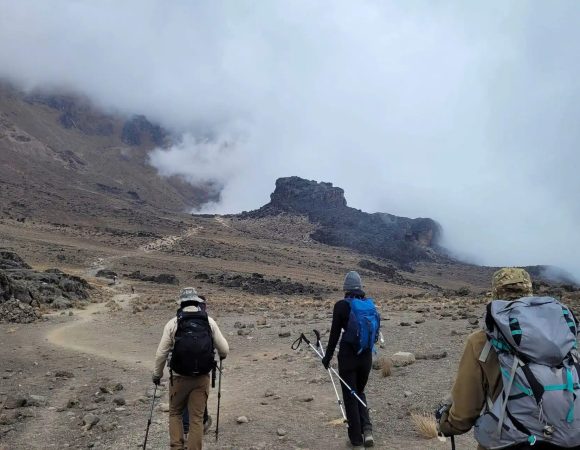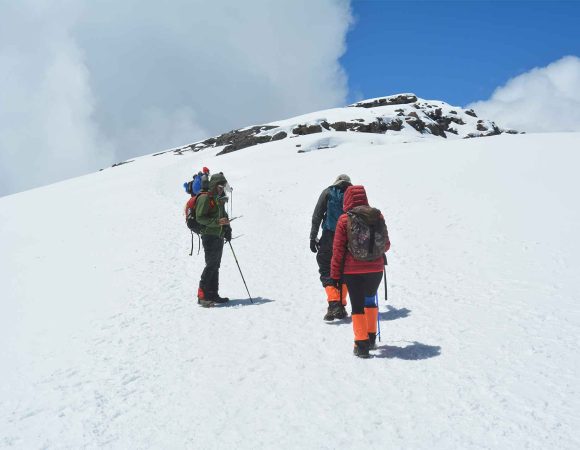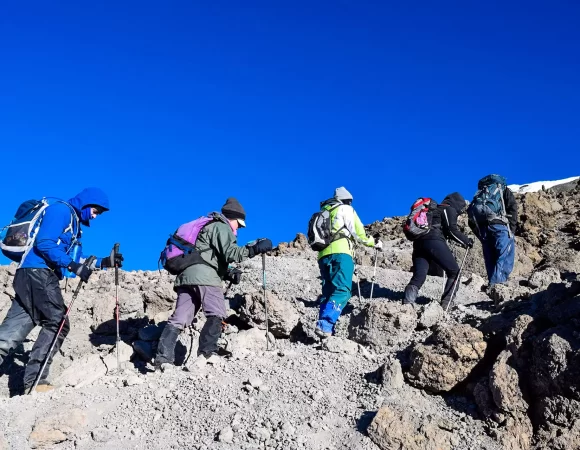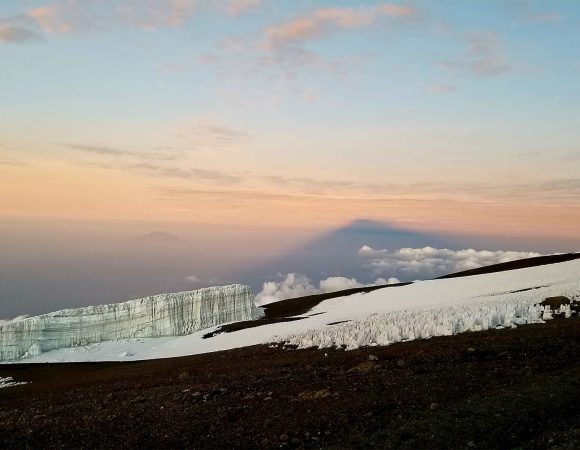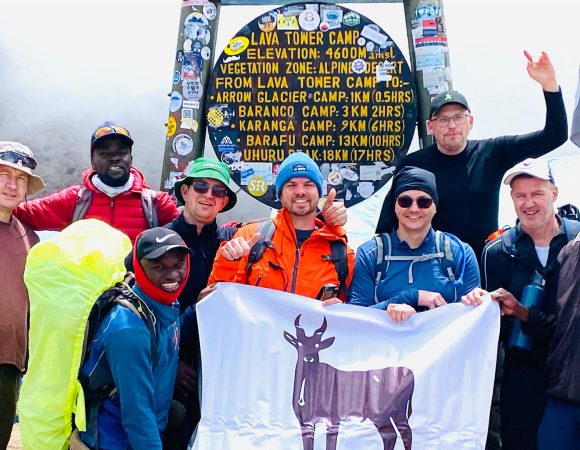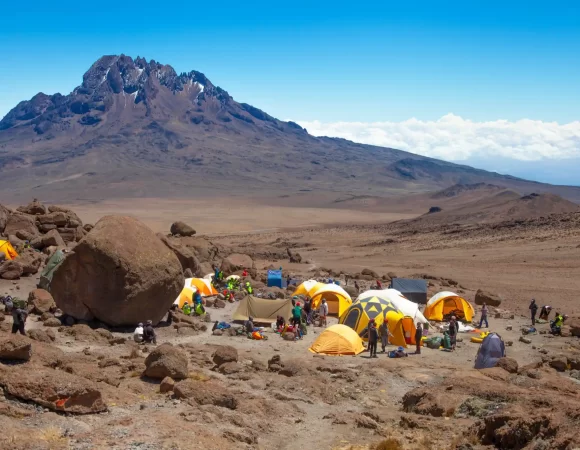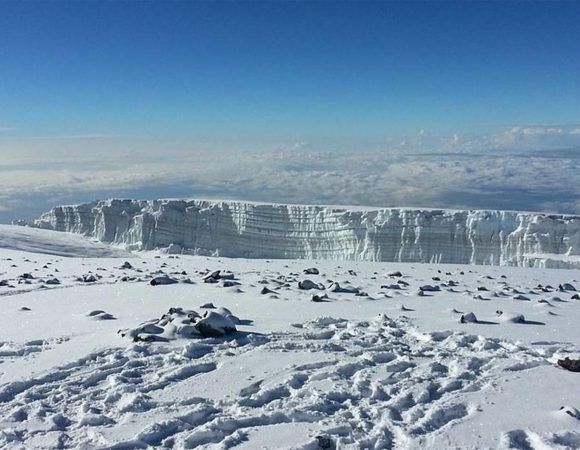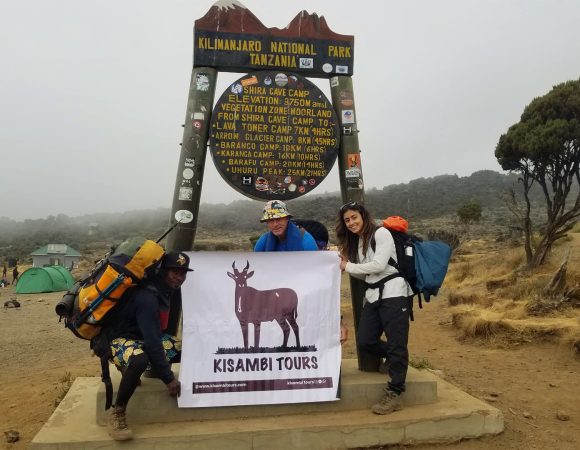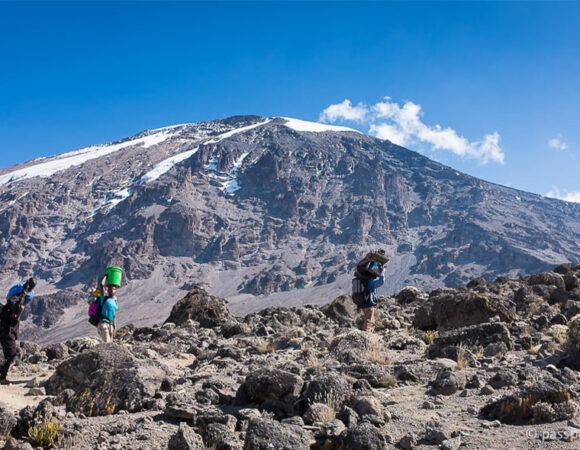7 Days Kilimanjaro Climbing Rongai Route
Tour overview
The “desert route” has its own very special charm. The Rongai route leads across the rarely used, rain-poor northeast flank of Kilimanjaro. The route starts near the Kenyan border, and offers great views of the Kenyan savannah and rugged Mawenzi. The trail leads first through fir forest and lighter rainforest, whilst at the Mawenzi Tarn Camp you will pass the only mountain lake on Kilimanjaro. The mountain massif is exceeded during this tour, and the descent is via the Marangu route. Due to the drier climate, the route is also suitable for ascents during the rainy season. The route is relatively easy, but some rock passages in the summit area require a certain degree of surefootedness.
We recommend the Rongai route as a 7 day tour. For very fit mountain hikers, the 6 day tour is also suitable. The second day of the 6 day tour walks directly from the Simba Camp to the Kikelewa Camp, as the intermediate stage over the Second Cave Camp is omitted.
Tour Type
Duration
Tour Location
Airport Pickup
- Kilimanjaro Int. Airport (KIA)
Tour Highlights
- Exceeding the Kilimanjaro
- Ascent via the Rongai route, descent via the Marangu route
- Very varied route from the dry north to the lush south
- Great views in the savannah and on the Mawenzi, on the route is the only mountain lake at Kilimanjaro
- Total distance about 70 km
Tour Itinerary
Kisambi Tours' representative will welcome you at Kilimanjaro International Airport (JRO) and accompany you to your accommodations for the night. Our guides are well connected with the country, so you'll be in good hands from the minute you arrive until you leave.
This morning we will drive to the village of Nale Moru for the starting point of the Rongai route. The first stage of the trek is through farmland and pine forests. You may have chance to see the beautiful Colobus monkeys or if you’re lucky enough, elephants or buffalos en route. Our first camp will be the Simba Camp located at the edge of the moorland zone at 2671m.
- Elevation: Start at 1,990m, end at 2,671m
- Hiking Time: 4-5 hours
- Distance: Approximately 7 km
- Difficulty: Easy to Moderate
- Habitat: Rainforest
- Meals: Breakfast, Lunch & Dinner Included
The morning hike is a steady ascent up to the Second Cave Camp located in the moorland zone with superb views of Kibo and the Eastern ice fields on the crater rim.
- Elevation: Start at 2,671m, end at 3,450m
- Hiking Time: 4-6 hours
- Distance: Approximately 8 km
- Difficulty: Moderate
- Habitat: Moorland
- Meals: Breakfast, Lunch & Dinner Included
Leaving the pine forest behind, we carry on with a steady ascent walking though moorland. There are superb views of the Eastern ice fields on the crater rim of Kibo, the highest of the three volcanoes which form the mountain. We will leave the main trail and strike out across moorland on a smaller path towards the jagged peaks of Mawenzi, the second of Kilimanjaro's volcanoes. We will set up camp today in the sheltered valley near Kikelewa caves at 3630m.
- Elevation: Start at 3,450m, end at 3,630m
- Hiking Time: 4-5 hours
- Distance: Approximately 6 km
- Difficulty: Moderate
- Habitat: Moorland
- Meals: Breakfast, Lunch & Dinner Included
This morning we have a short but steep ascent up grassy slopes which is rewarded by a superb view of the Kenyan plains to the north. We leave vegetation behind shortly before reaching our next camp at Mawenzi Tarn Hut directly below the towering cliffs of Mawenzi. This afternoon you have chance to rest or explore the surrounding area to aid acclimatization.
- Elevation: Start at 3,630m, end at 4,315m
- Hiking Time: 5-6 hours
- Distance: Approximately 7 km
- Difficulty: Moderate to Difficult
- Habitat: Alpine Desert
- Meals: Breakfast, Lunch & Dinner Included
We leave our campsite and cross the lunar desert of the ‘saddle’ between Mawenzi and Kibo After a couple hours trekking, reach this spectacular place, with the summit of Kilimanjaro in the background and our trail to the high camp stretched out before our eyes. Upon reaching our camp the remainder of the day will be spent resting in preparation of the final ascent after a very early night!
- Elevation: Start at 4,315m, end at 4,720m
- Hiking Time: 5-6 hours
- Distance: Approximately 8 km
- Difficulty: Difficult
- Habitat: Alpine Desert
- Meals: Breakfast, Lunch & Dinner Included
Today is “The Big Day” - the summit stage. You will begin your final ascent around midnight which will be long and strenuous. Passing the Hans Meyer Cave at 5220m, the climb slowly but surely goes upwards. At sunrise, you will reach Gillman’s Point (5681m) – the crater rim of Kilimanjaro – where the sun will slowly start to warm up the land. You will have soon forgotten the cold of the night and after a further hike of 1 - 2 hours, you will reach Uhuru Peak at 5895m. On your return to Kibo Hut, a warm meal awaits you followed by a 1 - 2 hour break before proceeding back down to Horombo Hut.
- Elevation: Start at 4,720m, ascend to 5,895m, descend to 3,720m
- Hiking Time: 10-15 hours
- Distance: Approximately 20 km (8 km ascent, 12 km descent)
- Difficulty: Very Difficult
- Habitat: Arctic to Alpine Desert
- Meals: Breakfast, Lunch & Dinner Included
The last stage passes through the heath and moor zone to the Mandara Hut (2700m) where a warm lunch is waiting for you. Soon, you will once again pass the tropical rainforest and after a total time of 6 hours trekking, you will be back at the Kilimanjaro National Park Gate (1860m). After saying goodbye to your mountain guides, a short transfer follows to take you back to your hotel in Moshi. Once there, you can take a warm and relaxing shower and celebrate your success in reaching the summit of the Kilimanjaro.
- Elevation: Start at 3,720m, end at 1,860m
- Hiking Time: 6-7 hours
- Distance: Approximately 20 km
- Difficulty: Moderate
- Habitat: Rainforest
- Meals: Breakfast & Lunch Included
Includes
- Kilimanjaro trekking according to the itinerary
- Professional, English-speaking guide
- Mountain crew (cook, summit porter& porters)
- Overnight stays in tents
- Camping equipment (tents, sleeping mats, tables, chairs )
- Meals according to the itinerary
- Drinking water, tea & coffee
- Oxygen tank and oximeters
- All national park fees
- Transfer from the hotel to the National Park gate and back
Excludes
- Alcohol and soft drinks
- Sleeping bag
- Flights
- Visa fees
- Tips
- Personal spending money for souvenirs
- Travel insurance
- Airport Transfer
- Pre and Post climb Hotel Accommodation
Gallery
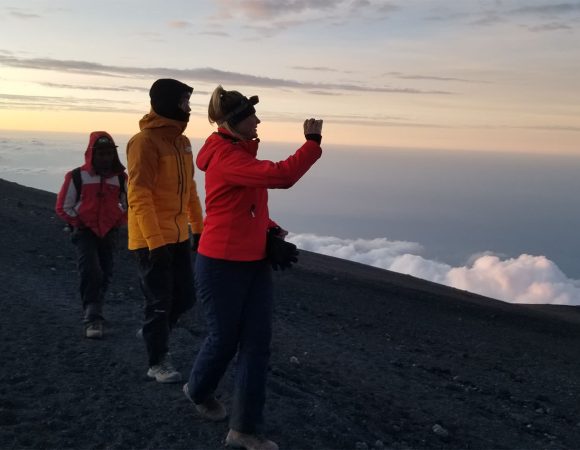
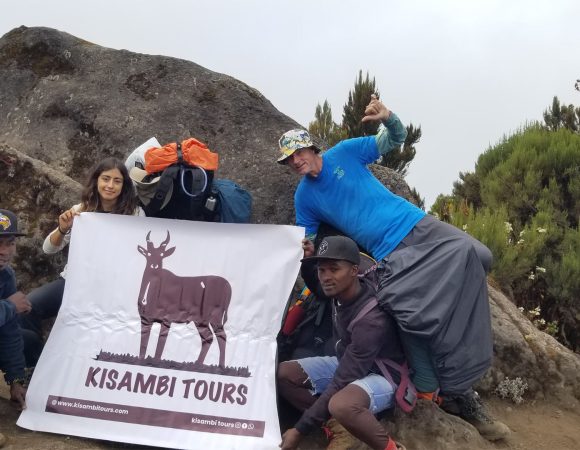
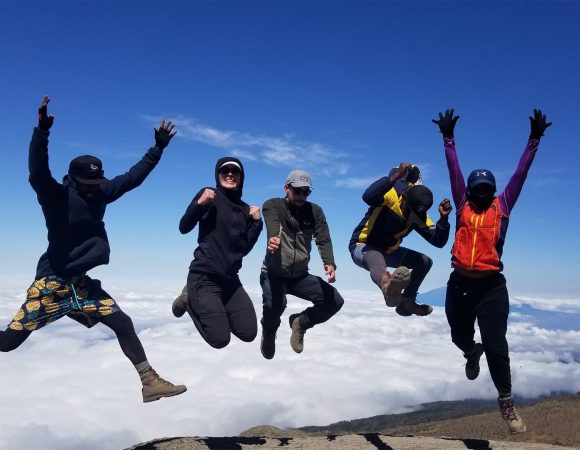
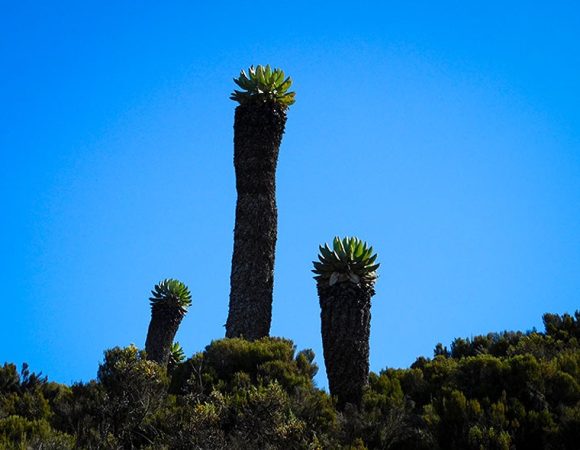
GROUP DISCOUNT
Group adventures have a predetermined charge per person based on group size. However, we offer optional options for specific private and tailor-made preferences that are best suited to you, your family, and friends.
| GROUP SIZE | PRICE PER PERSON |
|---|---|
| 1 Pax | $ 2250 |
| 2 Pax | $ 1960 |
| 3 Pax - 4 Pax | $ 1810 |
| 5 Pax - 6 Pax | $ 1760 |
| 7 Pax | $ 1730 |
HIKING FAQ'S
Best time to climb Kilimanjaro is a major Kilimanjaro Faq’s asked by most of the trekkers. Mount Kilimanjaro can be ascended year around and all the Kilimanjaro routes will support climbing Kilimanjaro round the year. As Kilimanjaro is near to equator the region experiences a very less extremes of winter and summer weather, rather it has wet and dry seasons. Hence, the Best Time To Climb Kilimanjaro is dry season which is warm. It is advised to avoid climbing Kilimanjaro during wet season for beginners. However, if you are with a professional climber and have all the safety precautions taken, then climbing Kilimanjaro in wet season would be really adventures. This also depends on your preference of Kilimanjaro Routes. You will need to choose best Kilimanjaro route and also choose a longer itinerary for better acclimatization.
The weather in Kilimanjaro is considered as wet season and dry season. Before knowing about Best Time To Climb Kilimanjaro”, the weathers and climates are very important to decide for Climbing Mount Kilimanjaro. All the Kilimanjaro routes pass the ecological or climatic zones where the weather tends to change hourly due to the high-altitude condition and the trade winds. The wet season has more rainfall and dry season has lesser rainfall with more dry days. The main climatic zones are: Cultivation zone, Rainforest zone, Heath or moorland zone, Highland dessert zone and Artic zone. Each zone are unique in its own way and also have a distinct weather conditions all the way.
The Kilimanjaro Food during your climb will help you to avoid from Kilimanjaro Altitude Sickness. The menu on Kilimanjaro is designed to ensure your food intake matches your level of exertion. It will provide you with a good balance of protein, carbohydrates, fruit and vegetables. When you are at altitude you could start to feel uneasy and your appetite may be suppressed, so the meals prepared at high altitude usually contain more carbohydrates and less protein to help you to digest your food. Your meals will be prepared by your cooks on Kilimanjaro and the food will be carried by your porters. You will be provided with Porridge, Toast, Pancakes, Egg, Smoked sausages, Tea, coffee and Hot chocolate. Sandwiches, Hard boiled eggs, Biscuits, Fruit juice. Soup, Pasts, Rice, Potatoes, Chicken, Beef, vegetables, Salad and Fresh fruits.
The Kilimanjaro Food during your climb will help you to avoid from Kilimanjaro Altitude Sickness. The menu on Kilimanjaro is designed to ensure your food intake matches your level of exertion. It will provide you with a good balance of protein, carbohydrates, fruit and vegetables. When you are at altitude you could start to feel uneasy and your appetite may be suppressed, so the meals prepared at high altitude usually contain more carbohydrates and less protein to help you to digest your food. Your meals will be prepared by your cooks on Kilimanjaro and the food will be carried by your porters. You will be provided with Porridge, Toast, Pancakes, Egg, Smoked sausages, Tea, coffee and Hot chocolate. Sandwiches, Hard boiled eggs, Biscuits, Fruit juice. Soup, Pasts, Rice, Potatoes, Chicken, Beef, vegetables, Salad and Fresh fruits.
It is better to check with your doctor or centre of disease control before leaving for any recommendations. This one of the major Mount Kilimanjaro Facts you should take into considerations. However, while entering Tanzania you will need a yellow fever vaccination certificate and also malaria vaccination certificate. Apart from these other vaccinations are not compulsory. However, it is better to consult your doctor for Vaccinations for Kilimanjaro if you have asthma or any chronic health problems.
The usual ratio is three or four local staff for each climber, although small groups may have four or five staff per climber. The staff usually consists of an English speaking guide or guides, a professional cooker, and gear-carrying porters. We encourage you to interact with your staff. They are all trustworthy, local people who have grown up in the shadow of the mountain. Many of them have climbed the peak a hundred or more times.
We can measure each day in walking hours rather than kilometers. Most days, other than the summit day, will begin with breakfast around 6:30 AM and departure at 7 AM. You will walk four to five hours with a break for lunch followed by another hour or two of hiking in the afternoon. These days are not long or difficult and you will be advised to walk slowly.
We recommend a minimum of eight days from the USA and Europe, although some people may wish more time for the trip. We can customize itineraries or routes to offer more days in the park(s). Some people may wish to climb nearby Mount Meru as well. If you have more than eight or nine days, you can choose any of the main routes on the mountain and still have time for a wildlife safari before or after your trip.
Words from Our happy Clients
We have received feedback from our clients, and Kisambi Tours is rated 5/5 by them. Customers grant us this honor because we are constantly committed to doing whatever it takes to ensure that their safari is completely satisfactory.
Verified Best experience ever: Mount Kili My experience as a solo Mount Kilimanjaro climber with Kisambi tours was one of the best experiences of my life. The owner of Kisambi tours, Mr Elisante is the kindest and offers the best services. My Guide, Matty was heaven sent. He is all about positivity. He was there for me when I wanted to give up. Thank you, Matty. You are a Star 🌟 The porters and the cook were amazing and wonderful. Five stars meals during my climb. I will do it again just for the good (Hahahaha)! Kisambi tours, thank you for this amazing experience. Much loveTeoVerified Excellent experience as a solo traveler Tanzania Safari on your own? I kind of thought I was crazy to do this, but a friend who has done Safari 3x said it is her dream to have the truck entirely to herself. And now, I understand why. I have never felt so spoiled. If you are thinking about a Tanzania or Tanz/Kenya Safari, I can highly r Kisambi Tours & my guide, Elvis. It was a dream. We saw the big five +++. Elvis has 20 years of experience and knows exactly where to go every day. He does not listen to the nattering on the radio, people call him because he has 20 years of friendships in the Parks. He made sure everything was perfect and is terrific company. The trucks from the big companies looked crowded & uncomfortable. And when I was in the hotels and camps, people that were on long tours in big groups said there were some fractures in the groups & people not getting along. It's a hot & dusty AMAZING experience, so my very small group of just me and Elvis 🤣 got along just fine! The owner, Elisante, checked in with me on WhatsApp often, to make sure everything was going smoothly. I'm quite sure the big big companies do not do that :-). If you're thinking solo Safari, do it. I'm so glad I didn't book with a tour company. I'm so sad it's over, but so glad it happened ❤️🦛🦓🦒🦁🦏Verified Tarangire, Serengeti and Ngorongoro with Dieter Dieter was an excellent guide, who drove us safely to every place. He knew all the zones and allowed us to see so many animals. He helped us in deciding when to leave in the morning, was kind and recognized/explained so many animals. We are really grateful to have travelled with him.Verified Excellent day! Polite guide! Professionally treatment Fantastic experience, happy 😊 trip, professional stuff. We enjoy so much the hole experience! We felt safe and happy with the guide and driverVerified Safari with friends and family We just came back from a 6 day private safari Tour in Tanzania and had such a great experience. We were a group of 8 and had two vehicles. They were driven by Joseph and Ernest. These guys were great. They knew everything about the area, and all about the plants and animals. They made sure we had the best view of the animals in all the parks.Verified Kilimanjaro Hike We went on a 6-day hike to the top of the Kilimanjaro; simply one of the greatest experiences in my life. Apart from the beautiful views, the good care by our guides and the good food made it a hike never to forget. I'd recommend these tours to anyone.Verified Amazing experience with Kisambi In particularly, we wanted to book with a Tanzanian tour operator, so ended up at Kisambi tours, which was recommended to us by a friend. From the beginning onwards, Elisante was very helpful in discussing the possibilities for our tight schedule, and provided us with travel itineraries for all options. The communication beforehand was very smooth, making the preparations upon arrival in Moshi very pleasant. Upon arrival at the bus stop, we were picked up and since then, it felt like an 'adventurous all-inclusive holiday to never forget'. Both the climb as well as the safari were private (I think this is most often the case).We started with a 7 day Lemosho Kilimanjaro hike, in which we were accompanied by our guides Rama and Amani. The guides were super friendly, and knowledgable. The porters (8) made sure to arrive at the camp earlier than we did, in order to be able to change clothes immediately, or sit on the camping chair. It was nice to see that the porters and guides really team up (they always works together in this composition). We were truly amazed by the food that was prepared during the climb, especially considering the limited utilities. Upon arrival, hot water was provided for water/hot chocolate/ tea, accompanied by popcorn. When possible, the chef prepared a warm lunch halfway. In the evening, dinner started with soup, and always fruit as dessert. Whereas I could overcome the 'toilets' at the campsites, looking back: my friend would have paid an additional fee to have a portable toilet along. After the climb, we were dropped off at our hotel to get a hot shower and rest for a bit. The next morning we were picked up by Gabrielli for our next adventure: a 3-day safari in Tarangire, Ngorongoro crater and lake Manyara. Gabrielli was very relaxed, knowledgeable and respectful towards the animals. Especially his attitude towards the animals: 'We'll just wait here for a bit and they will come to us: you'll see', made him a really good guide, since in our opinion other safari vans could be very intrusive towards the wildlife. All in all, our experience was really good and we would totally recommend Kisambi to anyone planning to go to Tanzania.Verified Unforgettable hiking experience I booked through Elisante the 8-day Lemosho route up Kilimanjaro with my buddy to celebrate our milestone birthdays. We ended up only needing 7 days, and had an amazing time, took amazing pictures, and am truly grateful for our experience. Was it hard? Yes, but totally worth it. Our tour guide, Rama, was motivating, friendly, and so knowledgeable. He helped turn a tough experience into one where we can look back and say we climbed one of the tallest mountains in the world. Shout out to the crew of porters as well— so nice and helpful. The food wasn’t bad— I was happy to get a vegetarian meal. One tip— ask about and spring for the private bathroom!Will consider going back one day with kids.Verified One day Maasai village tour My husband and I booked the one day tour for Maasai village and Chemka hot spring. We had unpleasant experience at Maasai village. We are not sure how authentic they are, but everyone in the village tried to sell us things at ridiculously high price.However, our tour guide is knowledgeable and friendly.Verified Excellent organisation I've just spent one week in Tanzania organised by this agency. Everything was absolutely perfect, from the arrival when Alen came to pick us up till the end of the journey. We were 9 people, guided by two excellent rangers Kelvin and Timothy and the great local guides Alen and Innocent. I was guided by Alen and Kelvin. They all are very smart and have great knowledge about parks, animals and culture. Alen was very kind and genuine, reassuring the group about the safety and giving good explanation about anything we asked.Another special appreciation to Kelvin, who contributed to a memorable, unique trip thanks to his safe guide, his excellent communication in Italian, his friendly manners and his passion for this job as he explained peculiar characteristics of each animal and social communication among them; he even had the sixth sense for finding hidden animals. I truly appreciated that. The tours were well organised, no stressful timings, yummy food prepared by very friendly chefs. We all dined together and then chilled out after a long day as old friends ☺️ I do thank them for rendering my birthday in Tanzania memorable with a big surprise 🎉🇹🇿 I truly recommend it!
Related Tours
will serve as a starting point, keep in mind that your path will be entirely unique to you.
- Quality4.67
- Location5
- Amenities4.33
- Services5
- Price4
5 Days Kilimanjaro Hiking Via Marangu Route
- Quality4.67
- Location5
- Amenities4.33
- Services5
- Price4
8 Days Kilimanjaro Climb Lemosho Route
- Quality4.67
- Location5
- Amenities4.33
- Services5
- Price4
7 Days Kilimanjaro Climb Machame Route
- Quality4.67
- Location5
- Amenities4.33
- Services5
- Price4
6 Days Kilimanjaro Climbing Rongai Route
- Quality4.67
- Location5
- Amenities4.33
- Services5
- Price4
7 Days Kilimanjaro Climbing Umbwe Route
- Quality4.67
- Location5
- Amenities4.33
- Services5
- Price4
6 Days Kilimanjaro Climbing Umbwe Route
- Quality4.67
- Location5
- Amenities4.33
- Services5
- Price4
6 Days Kilimanjaro Trek via the Marangu Route
- Quality4.67
- Location5
- Amenities4.33
- Services5
- Price4
7 Days Kilimanjaro Climb Lemosho Route
- Quality4.67
- Location5
- Amenities4.33
- Services5
- Price4
6 Days Kilimanjaro Climb Via Machame Route
- Quality4.67
- Location5
- Amenities4.33
- Services5
- Price4


